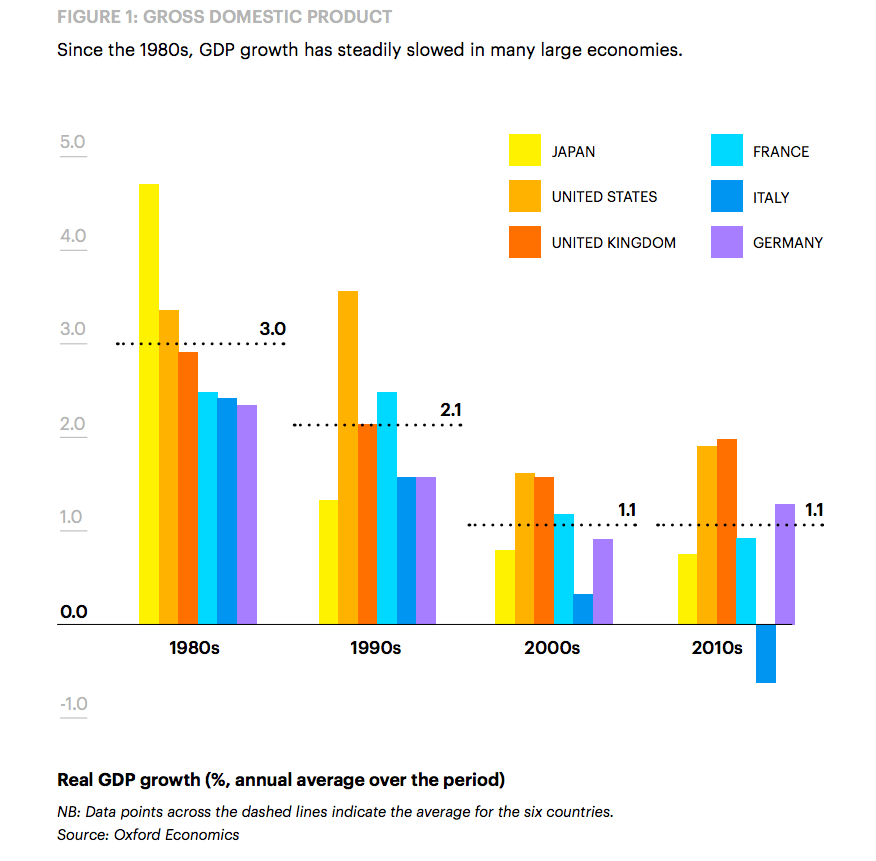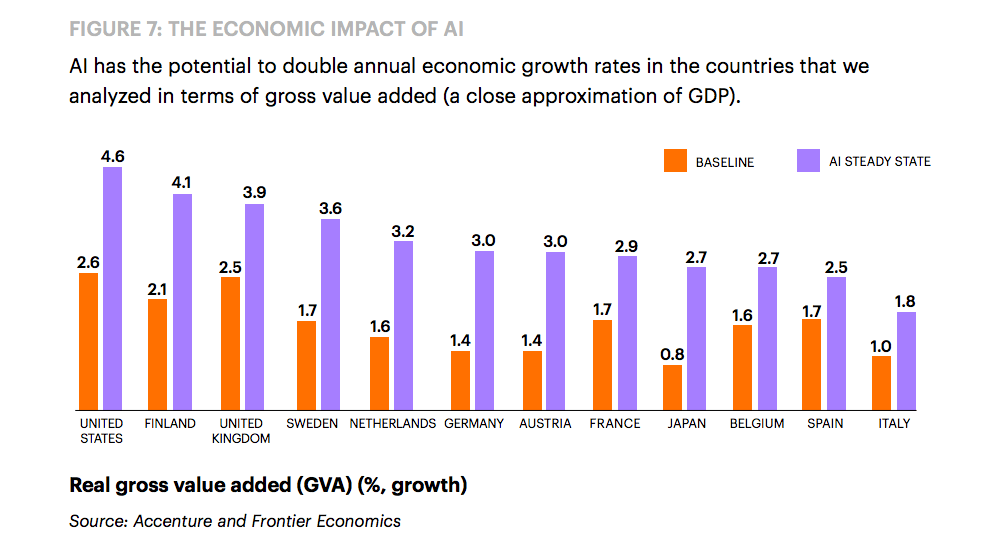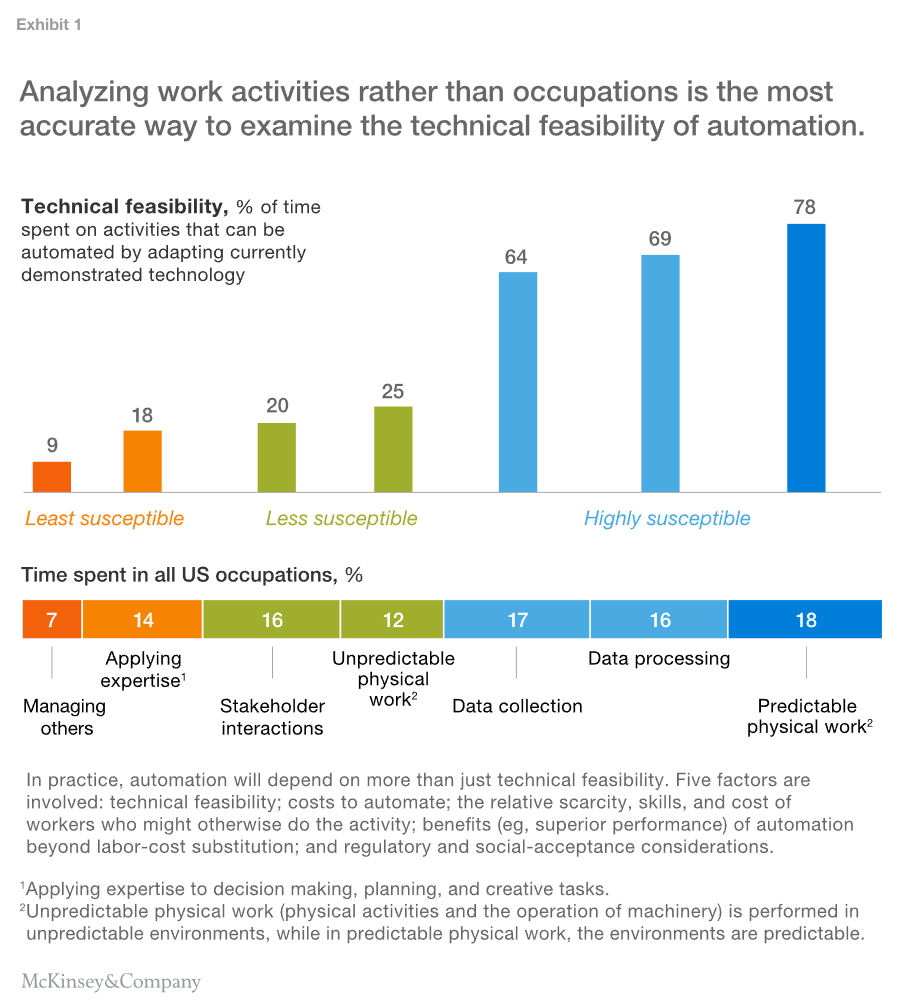A ways back in October 2016, Donald Trump promised 4% growth for the United States economy. (How’d that turn out?) Around the same time, the Federal Reserve Bank of San Francisco predicted a “new normal” growth rate of 1.5% to 1.75%. Thing is, Trump’s number wasn’t entirely impossible – even if it came from a place of ignorance. In fact, many economists today are predicting that artificial intelligence will drive unprecedented economic growth: upwards of 4.6% or more.
But how will this occur? Here’s the short answer:
Artificial intelligence helps people do more work, in less time, with fewer resources and less expertise.
Recent GDP Growth Has Slowed
We’ll start with some context. Worldwide, gross domestic product (GDP) has been pretty stagnant. Growth in many large economies has averaged a meager 1.1 percent since 2010. See this chart from a recent Accenture report, “Why Artificial Intelligence is the Future of Growth“:

Things are about to change. Enter artificial intelligence.
Artificial Intelligence Changes the Economic Game
Let’s define some terms. Capital measures the value of human-made goods and the means of production. Labor represents the work done by people, and the skills those workers possess. Economic growth occurs when capital or labor increase, or when they’re used more efficiently.
Historically, innovations like the steam engine and typewriter have either increased capital or labor, or helped people use them more efficiently. Artificial intelligence changes the game by acting as a force multiplier for both capital and labor.
Artificial/Augmented Intelligence will Double Economic Growth
AI’s ability to enhance both capital and labor is unique. According to the study by Accenture, artificial/augmented intelligence will nearly double global GDP in the next 20 years. These are numbers we haven’t seen since the 1980s.

AI-powered technologies will help humans develop better tools to produce goods and services (capital), and let us focus our work activities (labor) on whatever produces the greatest value. And because it can learn as it goes, AI’s ability will only increase as time goes on. In fact, AI may be the single greatest economic growth factor in history.
But how will this look in practice? Let’s start with the impact of AI on white collar (office) work.
Augmented Intelligence, not Artificial
For data analysts and business users, “artificial intelligence” is a false flag. The real value is in augmented intelligence: machines that enable humans to focus on the parts of their job that add the most value.
For example, a company that provides risk modeling services to insurers is using AI-powered software to improve their underwriters’ risk-pricing abilities. This company’s AI can read 22+ million research papers in minutes. How long would it take a human to do that?
Related article: Using AI To Solve A Business Problem
Because their AI handles the reading, this company’s data analysts can focus on analyzing. As a result, they’re able to price-risk more efficiently and more accurately. They can even create new insurance products to meet changing demand.
This is augmented intelligence in action in a white collar setting.
AI Improves Capital Efficiency
Intelligent machines (think robots) increase capital efficiency by reducing factory downtime and increasing production. Robots are perfect tools for performing repetitive or dangerous tasks.
A recent Washington Post exposé describes factory workers in Wisconsin working in harmony with robots. This is a great example of AI driving growth in manufacturing. Where humans can’t or won’t do the work, intelligent machines fill in and make everyone more productive.

Now, the subject of AI’s impact on blue-collar work is an enormous subject in and of itself. In fact, I’ve written an entire article on the subject. Go check it out: AI Automation Armageddon: Fact or Fiction?
Wrapping up and further reading
To wrap up:
- AI changes the economic game by acting as a force multiplier for both capital and labor
- The true value of AI in white collar work is is in augmented intelligence
- The impact of AI automation in blue collar work will be enormous
I’ll leave you with a few more articles on the subject of AI’s economic impact and how that will occur.
How to Use AI to Solve a Business Problem – Forbes
3 Surprising AI Applications in Food, Energy and Airlines – Lexalytics, an InMoment company